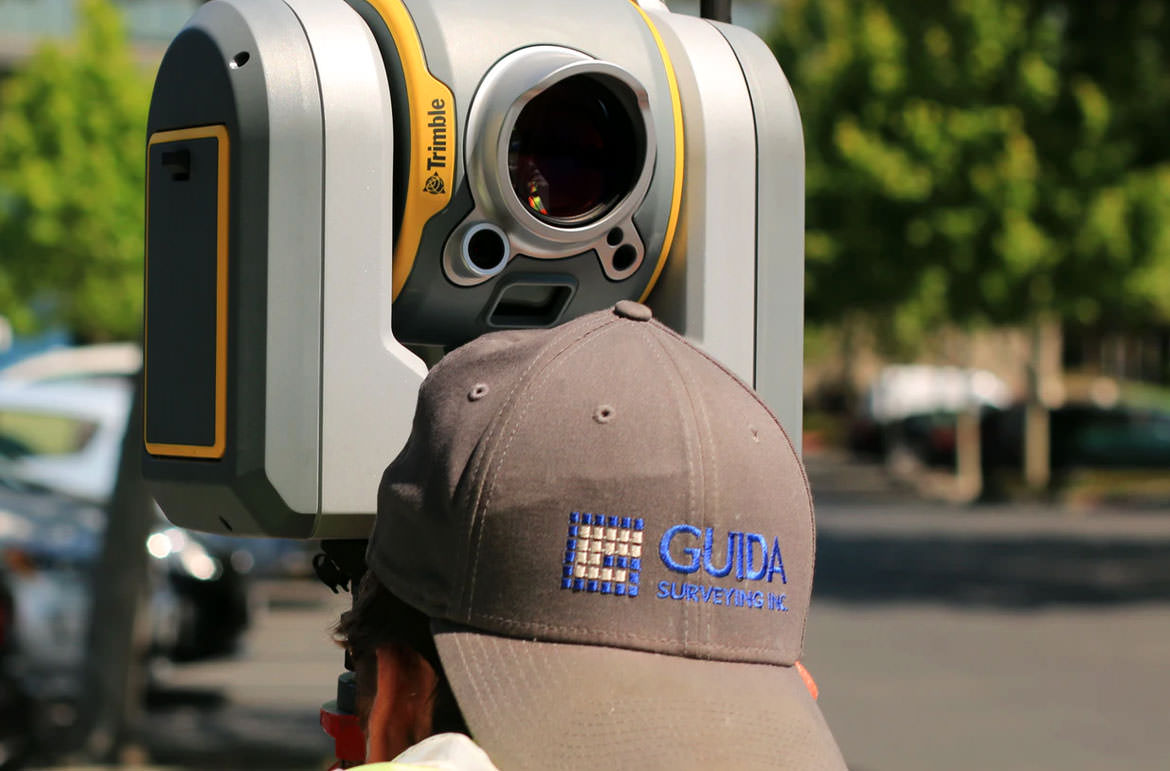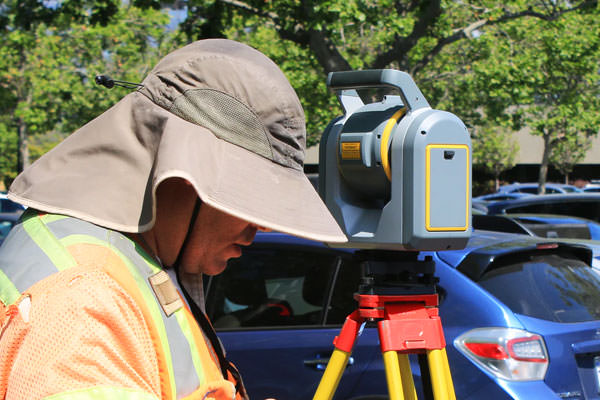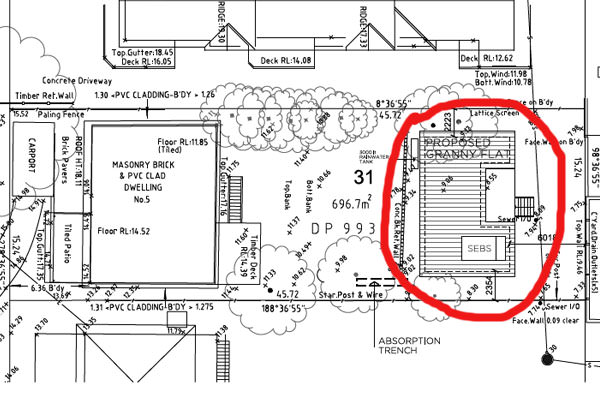
If you are planning to build a granny flat, you may be wondering what professionals you need, starting with: do you need a surveyor for a granny flat?
Yes, before you submit a DA or a CDC, you will need a surveyor to map out your land and provide a survey (also known as plans or drawings), that will be submitted along with your application to be accepted by Council.
Today I will talk about surveyors – what they do, and whether your surveyor needs to come on site.
DON'T PAY A FORTUNE FOR YOUR GRANNY FLAT. Find out how to deal with council and build a granny flat for the lowest cost possible. Learn More.
Lastly, I will provide you with a list of recommended surveyors in each state.
What is a Surveyor? Are They All the Same?
You may have heard the terms land surveyor, building surveyor or quantity surveyor, but do you actually know:
- The difference between these occupations.
- Their qualifications, or
- Which one you will require?

Not all surveyors are the same. See my list of recommended companies below
I will explain the difference between these qualifications for you now.
Land Surveyors
Land Surveyors play an important role in the construction industry. Without them, nothing would be built accurately – roads, bridges, buildings, even granny flats.
Land surveying is a vital step in beginning the construction of your granny flat. A Land Surveyor is a qualified professional who uses mathematics, science, and specialised technology and equipment such as:
- Robotic Total Stations (theodolites), GPS receivers, global positioning technology, aerial and terrestrial scanners, etc.
This helps them to determine:
- The terrestrial, 2D or 3D location of points, and the distance and angles in the space between them.
An experienced Land Surveyor will be able to deal with architects, engineers, builders, town planners, etc.
The role of a Land Surveyor includes:
- The measurement of your property.
- Locating buildings, roads, and utilities.
- Recording the space, positioning and angles between two points on the ground, using “benchmarks”(reference points) as a starting point.
- Marking their locations on highly detailed maps (known as surveys), including easements, soil conditions and structures on the land.
So, they will:
- Accurately measure and mark out the primary property boundaries on your site.
- Produce preliminary markers to establish where your granny flat will be located on the land, and
- Ensure it is in a position that can be approved through your Councils’ regulations.
Getting these measurements correct is crucial if you want to avoid building or legal problems after construction begins.
After consultation with a Land Surveyor, your builder will begin ‘setting out’ the property.
This involves marking out every boundary of the granny flat from the preliminary markers created by the Land Surveyor.
From the survey report the builders (or you as an owner-builder) will be able to run string or ropes between corner stakes on the site, creating an outline of where your granny flat will go.

Your designer will need the survey report to position the granny flat.
Other areas (i.e. easements) will also be marked out, to ensure the development complies accurately with the original building plan.
At times, this process is performed by the land surveyor, however this is more likely to happen on commercial projects.
There are multiple ways someone can become a Land Surveyor:
- Vocational training is accessible to become a survey assistant or a survey technician.
- To become a professional surveyor, an undergraduate degree or undergraduate and a masters is required, (depending on where you study).
- After graduating, additional study is then necessary to become a licensed or registered surveyor.
- Though, in Australia, you can still become a highly skilled Land Surveyor with a diploma.
Quantity Surveyors
A Quantity Surveyor may have more qualification – they must have completed an accredited tertiary qualification, including:
- A Bachelor of Construction Management, then must do,
- Two years’ worth of “on the job” logbook experience, then must,
- Undertake a professional competence interview.
However, their skill is in preparing a tax depreciation schedule.
A Quantity Surveyor specialises in:
- Building measurements.
- Contracts, and
- Approximating the value of construction costs.
Meaning, during various stages of construction, they are able to establish how much the building works is costing a property.
This profession is more like a combination of architecture and business, as they can:
- Advise you what the most economical approach will be.
.
- Building laws and codes, and
- Construction standards.
A Building Surveyor is responsible for making sure that buildings are safely built to current building standards.
To summarise and prevent confusion, it’s worth noting here that there is a big difference between a:
- Land Surveyor,
- Building Surveyor, and
- Quantity surveyor.
A Land Surveyor will assess the spatial layout of your site, ensuring you have enough room for your granny flat.
A Building Surveyor will deal with legal issues and permits in planning and construction.
A Quantity Surveyor will keep a record of costs and materials used for construction, for purposes of depreciation.
So, for the aim of getting a survey to get a granny flat approved, I will be talking about Land Surveyors from hereon.
Can You Be Approved Without One?
Short answer – no.
A surveyor will play an integral role in your project.
You will need a surveyor to assist you in providing a set of plans (a survey) your Council will accept.
Just exactly what is required will vary depending on your Council, but is typically includes:
- A site plan at a minimum scale of 1:200, showing:
- The distance the proposed development will be setback from boundaries and all other structures.
- Existing and proposed ground levels (with contours picturing levels to the AHD (Australian Height Datum)).
You may find that these are called a contour survey, site survey or feature survey.
The names of these surveys are different but to a surveyor they basically mean a similar thing.
This is required to be submitted with your Complying Development (CDC) or Development Application (DA), before approval will be given.
Please note – As mentioned, this is only a generalisation of the survey required by Councils’, this will vary as per your location.
Does Your Surveyor Need to be On Site?
Yes – a surveyor needs to come to your property and map out the land.
They will be out on site, using the latest technology to map the area, making calculations, and taking photos as proof.
This work is the foundation of information upon which your:
- Designer (i.e. an architect) will use to do their phase of the development – I will elaborate on this shortly.
It’s important to understand that there are a many different factors that come into surveying land for its’ proposed development, such as;
- Setbacks.
- Landscaping and privacy, so adjoining buildings are also surveyed including the location of windows and doors.
- Minimum land size.
- Building heights, so the slope of the land.
- Floor space ratio, so existing structures.
- Heritage or vegetation protection on the land.
- Any utility services that are present.
Having your boundary lines and land heights accurately measured ensures you can overcome all of these issues and complete your development.
For example, it’s crucial to know the location and heights of drainage and sewage-works if the land is:
- Near a waterway.
This is often the deciding factor of the floor level of the secondary dwelling.
Can You Have a Designer Craft Your Plans with the Survey Report?
Yes – as above, surveyors are often the first people on a development site.
Once they measure and map your land, these measurements can then be used by architects to:
- Understand your unique landscape, and
- Create the best possible design for your site.
This ensures buildings not only fit in with the landscape but are able to be constructed for your site.
What to Look for in a Surveyor
You need the services of an experienced land surveyor.
A few key things to look for, and some important questions to ask, are:
- A good reputation – A trusted professional will have an established reputation, which speaks for itself. Tell friends, family, or colleagues in the area that you are seeking a surveyor and ask who they have used before. A great reference can give you so much information – if they are honest, skilled, if they will give you accurate results.
- A license to work in your state – You can check the Surveyors Registration Board for your state. You can usually search this by surname or Registration number. It will tell you if they are practising, non-practising, suspended or expired.
- Do they protect their workers? – It is crucial for you to know that your surveyor has workers compensation. This demonstrates that they are responsible and safe – all qualities a surveyor should have. Should a member of their team be hurt whilst on your site, you also want to be protected.
- Experience in the service you require – Surveyors handle multiple projects, from mapping large areas to engineering surveys. To see if they have experience in the work you’re seeking, ask for references. Then ask for more. Follow up those references by calling them and asking what they were like to work with.
- Ask them about ongoing training and the latest technologies – As you narrow down your selection of surveyors, start considering their skill set. You want to ascertain their companies’ approach to further education. It is important to ask: “Are they using the latest technology and equipment?” A friendly, knowledgeable surveying team should be happy to answer this question for you.
- Do they check their work – A surveyor should always check their work for accuracy. This attention to detail is highly important. Ask the company how they ensure their work is accurate?Their answers should include reviewing existing or current maps and surveys, and thoroughly checking their data.
Is a Surveyor at Fault if Your Granny Flat is Not Approved
No, there is more to getting your granny flat approved than the surveyors’ role. This is why it’s important to do your research first and find out exactly what your Council requires for approval.
It is important to note that it could be something as simple as:
- They don’t like the look of a cheaper design, if it does not fit in with the look of your surrounding neighbourhood.
However, it is still important to use a licensed surveyor. As mentioned, each state has its own governing body, so I recommend that you check your surveyors license with them.
This is as a licensed surveyor is the:
- Only person who is legally permitted to perform a survey and mark the boundaries of your property.
Meaning, a survey that is prepared by a non-licensed surveyor has no legal standing. It is important to understand that, if a boundary dispute was to occur, these surveys will not be acknowledged as evidence.
List of Surveyors in Each State
A surveyor may not come cheap – graduates earn an average of $55-60k per year.
However, they have access to the latest technology and equipment, which is always changing. They can work for themselves, in private firms or as part of government departments.
I have provided a list recommended Land Surveyors throughout Australia below:
New South Wales
- C&A Land Surveyors – (02) 9630 9299
- SurveyPlus – (02) 9651 2921
- Sydney Surveyors – (02) 9708 0177
- Stuart de Nett Land Surveyors – (02) 9526 6333
- Sydney Land Surveyors – 0425 203 977
- Citisurv Pty Ltd – (02) 9647 1142
- Pinnacle Land Surveyors – (02) 9686 2548
- SJ Surveying Services – 0408 671 199
- ATS Land & Engineering Surveyors – (02) 9808 6854
- Rygate Surveyors – (02) 9262 6800
- Waterview Surveying Services – 0474 843 180
- Pulver Cooper & Blackley Pty Ltd – (02) 4934 3026
- Vince Morgan Surveyors Pty Ltd – (02) 4721 5293
- Walpole Surveying – (02) 6021 2233
- Chris Abbott Surveying – (02) 6686 8939
- Leslie & Thomson Surveyors – (02) 4422 1233
- RAP Surveying – 0400 863 950
- Central Coast Surveyors – 1300 729 694
- Usher & Co Pty Ltd – (02) 9411 8166
- Rolls & Associates Surveyors – (02) 4353 9644
Victoria
- Melbourne Land Surveyors – 0412 722 261
- Stacey Surveying – 0400 531 138
- Smith Land Surveyors – (03) 5222 1234
- VicLand Surveying Pty Ltd – (03) 9331 4266
- JRL Land Surveyors Pty Ltd – (03) 9425 9944
- Linear Land Surveying – (03) 9873 8888
- Feature Survey Melbourne – (03) 9452 6969
- P M Kennedy Land Surveyor – (03) 9369 0730
- Land Management Surveys – (03) 9583 0888
- Land Dimensions Pty Ltd – (03) 9790 0399
- jREdwards Land Surveyors – (03) 9370 2209
- Barker Monahan Land Surveyors – (03) 9478 6133
- SMC Land Surveyors – (03) 9312 2247
- MG Land Surveyors – 0434 401 852
- VicSurvey – (03) 9585 7965
- Peter Richards Surveying – (03) 9432 6944
- Raven Land Surveyors – (03) 9818 5560
- Wilson Surveying – (03) 9735 9085
- SOS Surveying – 1300 887 319
- Accurate Surveying – (03) 5998 9548
Queensland
- Land Surveys – (07) 3267 0074
- Site Surveys – (07) 3367 0433
- Geosurv Brisbane – 1300 554 675
- East Coast Surveys – (07) 3823 1029
- Landmark Consulting – (07) 3219 9911
- Axis Surveys – (07) 3363 8100
- Ausurv Surveyors – Queensland Office – (07) 5450 7299
- DSQ Land Surveyors – (07) 5437 8555
- ONF Surveyors – (07) 5422 0200
- Steve Cooper & Associates – (07) 3846 6477
- M3 Surveys – 0402 825 835
- B.J.F Surveys Pty Ltd – 0437 949 395
- Arnold Development Consultants – 07 3333 1985
- Sunrise Surveying – 0409 955 227
- PJ Riley Surveyors – (07) 3800 4946
- TerraModus Surveying – (07) 4054 4072
- Sunshine Coast Survey & Planning Pty Ltd – (07) 5491 6333
Western Australia
- Zenith Surveying – 0415 856 548
- Land Surveyors Perth – (08) 9371 7686
- Horizon Surveys – (08) 9387 8226
- McGregor Surveys Pty Ltd – (08) 9322 2000
- Jurovich Surveying – (08) 9368 6225
- Ailia Surveys – 1300 736 272
- ST Spatial Pty Ltd – (03) 9349 2062
- Carlton Surveys – (08) 9361 5358
- Driscolls Land Surveyors – (08) 9385 1122
- Oracle Surveys Pty Ltd – (08) 9470 1888
- Pro West Surveying – (08) 9242 8247
- Greg Cole – 0439 999 479
- Xcel Surveying – 0400 224 357
- Crossland & Hardy Surveyors – (08) 9272 2214
- Links Surveying – (08) 9354 8511
- Survey Group – (08) 9443 8900
- JBA Surveys – (08) 9450 7188
- Perth Boundary Surveys – 0408 901 877
- LPD Surveys – 0467 573 789
- Surveying Solutions WA – (08) 9300 8137
- The Land Division – (08) 9242 8247
South Australia
- Hennig & Co Pty Ltd – (08) 8297 0883
- John C Bested & Associates Pty Ltd – (08) 8332 7111
- Alexander Symonds Surveying Consultants – (08) 8130 1666
- Donaghey Surveyors – 0413 802 732
- Michael Grear Surveys – (08) 8278 8732
- Mosel Surveyors – (08) 8821 3544
- Jurovich Surveying – (08) 6189 5060
- Steed Surveyors and Land Divisions – (08) 8362 7900
- 360 Surveying – (08) 8440 2412
- Veris – (08) 8642 3044
- Andrew & Associates – (08) 8232 1954
- J & S Surveyors – (08) 8373 4338
- Mattsson & Martyn Surveyors – (08) 7006 0122
- Sawley Lock O’Callaghan – (08) 8344 1522
- Cavallo Forest Licensed Surveyors – (08) 8346 0440
- JG Surveys – 0448 010 991
- Pyper Leaker Surveying Services – (08) 8373 3880
- Weber Frankiw Surveyors – (08) 8323 8991
- Olden & van Senden Surveyors – (08) 8370 9699
- Pennino & Associates – 0401 556 497
Tasmania
- Lark & Creese Land and Engineering Surveyors – (03) 6229 6563
- Rogerson & Birch Surveyors – (03) 6248 5898
- Woolcott Surveys & East Coast Surveying – (03) 6332 3760
- PDA Surveyors – (03) 6234 3217
- JTH Surveys – (03) 6383 4821
- Survey Plus – (03) 6273 9831
- BSTAS – (03) 6231 9070
- Radian Surveying – 0407 152 366
- Cromer & Partners Surveyors – 0419 353 414
- Survey and Alignment Services – 0429 003 584
- Cohen & Associates – (03) 6331 4633
- National Survey Solutions – 0407 514 538
- Pakana Services – (03) 6221 6111
Northern Territory
- Land Surveys – (08) 8984 4078
- Earl James & Associates – (08) 8981 2494
- Asphar Survey Group Pty Ltd – (08) 8981 0072
- Cross Solutions – 0447 870 117
Australian Capital Territory
- STEGER & ASSOCIATES Registered Land Surveyors – (02) 6296 4089
- Scott D McNiven & Associates Consulting Land & Engineering Surveyors – (02) 6290 2369
- Lonergan Surveying – (02) 6156 4699
- 4D Surveying – (02) 6280 7243
- Geosurv – 1300 554 675
- Kerry Surveys – (02) 6287 3300
- RealServe – 1800 961 668
- Mail McDonald Barnsley Pty Ltd – (02) 6251 4976
- TSD Surveying – 0439 440 604
Conclusion
Land surveying is a complicated, challenging role.
It is the measurement and mapping of our surrounding environment, using science, mathematics, specialised technology, and equipment. A surveyor will need to have a strong understanding of spatial awareness in both 2D and 3D.
The surveyor is usually the first one on your site, and this is a crucial step in beginning your development. Your project relies heavily on the decisions the surveyor makes while working there, such as:
- Accurately measuring and marking out your property’s boundaries, and
- Using preliminary markers to ‘set out’ where your new granny flat will be located.
They will use current technology to map out the site, make calculations and take photos to use as proof. A surveyor then gives advice and provides information to guide the work of engineers, architects, etc.
Accurately understanding the dimensions and topography (contours) of your site is important, as it ensures:
- What you plan to achieve will comply with building guidelines and your Councils’ regulations plans, and
- The end goal of your project will remain unchanged.
For example, as you are adding a secondary dwelling, you need to understand if everything will fit on your site, and:
- Also ensure you adhere to all regulations, such as setbacks and Principal Private open Space (PPOS).
Additionally, as you are proposing to build a new development, Council approval is required. To achieve approval, a professional survey is necessary.










